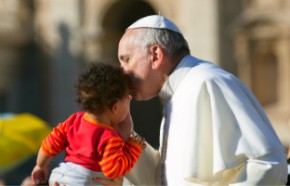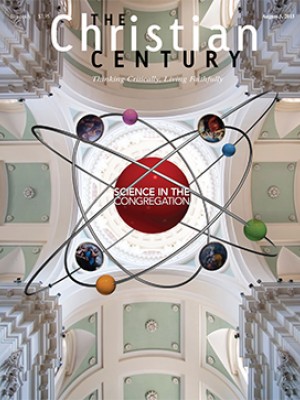Religion and politics do mix

The conventional maxim “religion and politics do not and should not mix” is not only wrong but misleading and downright silly. Of course religion and politics mix. Our deepest values are often rooted in our religious beliefs and inform how we live, how we order our priorities, how we spend our time and money, and how we vote.
What this statement really means is that “your religion and my politics don’t mix.” The maxim is often confused with the separation of church and state. The founders of the nation decided that the new republic would not have a state religion and an established state church. Citizens would enjoy a completely new phenomenon: freedom of religion and freedom to believe or not believe, to belong to a church or not, according to the dictates of one’s own conscience. No one thought it would work. How can a state survive without religious support? How can a church survive without state sponsorship?
Read our latest issue or browse back issues.
The wall separating church and state is mentioned not in the Constitution per se, but in a letter that Thomas Jefferson addressed to some concerned Baptists in Connecticut. One effect of the letter was to encourage citizens to seek civic and political involvement as an expression of their religion and to assume responsibility for their churches. American churches have been doing this—expressing their convictions with political ramifications—all the way back to colonial days when American Presbyterians, at their first General Assembly, addressed themselves to President George Washington.
Now Pope Francis has delivered his encyclical Laudato si’. He chose words from St. Francis of Assisi’s “Canticle to the Sun,” a poem that praises the Creator for the gift of the creation and assumes human responsibility for it. Using blunt language, the pope observed that we human beings have made a mess of things. He invoked scientific data to support his point and named climate change and global warming as major threats to all of us.
William Schweiker of the University of Chicago Divinity School observed that even before Laudato si’ was officially released, critics lined up to dispute the pope and to question not only his scientific credentials but also the appropriateness of the pope addressing an issue with huge economic and political implications. Catholic Republican presidential candidates scrambled to find a way to appease a conservative base that denies human involvement in climate change while not publicly disagreeing with the pope. Jeb Bush, a convert to Roman Catholicism, said he doesn’t get his economic policy from bishops and the pope. He elaborated: “I think religion ought to be about making us better people and less about things that end up getting us into the political realm”—that is, religion and politics don’t mix.
But they do: we want better health care and education for everyone because neighbor love is one of our deepest values and commitments. We want safe food, safe automobiles, and a judicial system that guarantees equal treatment for all. And we want a sustainable environment for our grandchildren.
The pope broke new ground, Schweiker points out, by unapologetically using current science to back up his claim about human involvement and by reminding us that religious conviction and scientific inquiry cannot and ought not be at cross purposes on critical public issues.
The pope also reminded us that the first and most severely affected victims of climate change are the poor and marginalized of every nation. Affluence insulates some of us. Some of us can purchase bigger air conditioners and move to cooler climes if necessary. But most of the people of the world cannot.
Whatever Protestant misgivings I have about the papacy, Francis, on this issue, is my pope.






